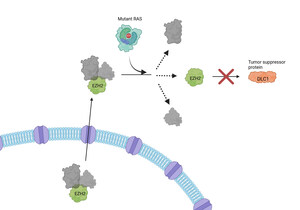Colorectal Cancer Screening for African Americans: It's about Prevention, Not Just Detection
By the National Cancer Institute
BETHESDA, Md., April 3, 2014 /PRNewswire-USNewswire/ -- If a screening test could not only catch cancer early but also help to prevent it, could you think of any reason not to have the test?
All widely used cancer screening tests aim to detect cancer early, when treatment may be more successful. But several screening tests can also help find abnormal cells that have not yet become cancer, allowing them to be removed before they can cause problems. Colorectal cancer screening tests, for example, can help detect pre-cancerous growths called polyps. Removing these polyps prevents them from becoming cancer.
Colorectal cancer is the third most commonly diagnosed cancer in both African American men and women. More than 18,000 new cases of colorectal cancer are diagnosed in African Americans annually. And although colorectal cancer rates overall are declining in the United States, the rates for African Americans are decreasing more slowly than the rates for white Americans. African Americans are also more likely to be diagnosed when colorectal cancer is advanced and, therefore, less treatable.
Between 2002 and 2008, the likelihood of surviving 5 years after a diagnosis of colorectal cancer was only 57 percent for African Americans, compared with 65 percent for white Americans. The difference between African Americans and whites in colorectal cancer survival rates has actually widened over the years. For example, the American Cancer Society recently reported that, for patients with advanced colorectal cancer, 5-year survival rates among African Americans rose from 8.6 percent in 1992-1997 to just 9.8 percent in 2004-2009, whereas among whites they rose from 9.8 percent in 1992-1997 to 15.7 percent in 2004-2009.
Although many factors underlie these disparities, an important one is that African Americans are less likely to be screened for colorectal cancer than whites. For example, in 2010, only 56 percent of African American men and women over the age of 50 had been recently screened for colorectal cancer, compared with 62 percent of white Americans.
A large 2005 survey carried out by the National Cancer Institute, called the Health Information National Trends Survey, found that many African Americans do not know that, when colorectal cancer is caught early, survival rates are good. In fact, surgery can cure about 90 percent of people with early-stage colorectal cancer.
Several effective options for colorectal cancer screening exist, which means that you can find a test that fits your risk, your concerns, and your comfort level. Knowing your options can make it easier for you to ask your doctor for more information.
Colonoscopy and sigmoidoscopy: For these tests, a doctor uses a flexible lighted instrument to physically check the colon and remove any abnormal growths.
Colonoscopy checks the rectum and the entire colon. Your doctor will give you special laxative medications to take before colonoscopy to clean out your colon. You will generally have sedation (you will be given medications to make you sleep or be very relaxed during the procedure) for a colonoscopy. Current guidelines recommend that people at average risk of colorectal cancer have a colonoscopy every 10 years.
Sigmoidoscopy checks the rectum and the lower half of the colon (the sigmoid colon). The lower colon must be cleansed before sigmoidoscopy, but the preparation is less involved than that for colonoscopy. With sigmoidoscopy, you will usually not need sedation. Current guidelines recommend that people at average risk of colorectal cancer have a sigmoidoscopy every 5 years (with fecal occult blood tests every 3 years).
Fecal occult blood test/fecal immunochemical test (FOBT/FIT), also known as a stool test: For this test, your doctor gives you a kit to use at home to take one or more samples of stool. The samples are sent to the doctor's office or lab to be tested for traces of blood. Some people prefer the stool test because it is done in private, is inexpensive, doesn't require taking laxatives, and is simple to perform. Current guidelines recommend that people who choose FOBT/FIT screening have the test every year.
Most guidelines recommend that people at average risk of colorectal cancer begin screening at age 50 and continue until age 75. If you are over 50 and have never been screened for colorectal cancer, talk with your healthcare provider about which colorectal cancer screening test is right for you. You can also ask about lifestyle changes that may reduce your risk of the disease. If someone in your family has had colorectal polyps or cancer, you may need to start screening before age 50. Again, your healthcare provider is the place to start.
Not having health insurance can keep people from getting screened. If you are uninsured or underinsured, the Centers for Disease Control and Prevention has a program in 25 states that provides colorectal cancer screening services to low-income men and women aged 50–64 years. More information on this program can be found at cdc.gov/cancer/crccp. Under the Affordable Care Act, all Marketplace plans and many other plans must cover colorectal cancer screening for people over age 50 without charging a copayment or coinsurance.
To learn more about colorectal cancer, visit the National Cancer Institute (NCI) website at www.cancer.gov (search term: colorectal) or call 1-800-4-CANCER (1-800-422-6237). You can also visit NCI's new educational website on colorectal cancer screening, gutcheck.cancer.gov, or CDC's Screen for Life: National Colorectal Cancer Action Campaign (http://www.cdc.gov/cancer/colorectal/sfl/).
NCI leads the National Cancer Program and the NIH effort to dramatically reduce the burden of cancer and improve the lives of cancer patients and their families, through research into prevention and cancer biology, the development of new interventions, and the training and mentoring of new researchers. For more information about cancer, please visit the NCI web site at www.cancer.gov (or m.cancer.gov from your mobile device) or call NCI's Cancer Information Service at 1-800-4-CANCER (1-800-422-6237). More articles and videos in the culturally relevant Lifelines series are available at www.cancer.gov/lifelines.
Logo - http://photos.prnewswire.com/prnh/20111018/DC89117LOGO
SOURCE National Cancer Institute
WANT YOUR COMPANY'S NEWS FEATURED ON PRNEWSWIRE.COM?
Newsrooms &
Influencers
Digital Media
Outlets
Journalists
Opted In






Share this article